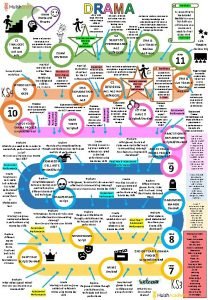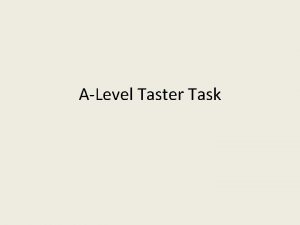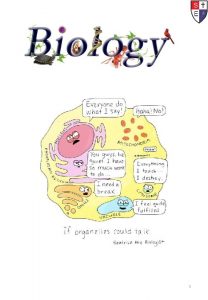Psychology ALevel An introduction The aim of this













- Slides: 13

Psychology A’Level – An introduction The aim of this resource is to introduce you to the vast and incredibly interesting subject of Psychology. You have a great opportunity to get to grips with what Psychology is all about before you come to study with us. We follow the OCR specification, however most of

Things to watch Marvellous - Amazon Prime Part biopic, part fantasy, this is the inspirational and incredible true story of Neil Baldwin. Neil refuses to accept the label of learning difficulties and leads an extraordinary life where he becomes everything from an honorary graduate of Keele University to the Stoke City kit man. A real uplifting story! The Mum who got Tourette’s - Channel 4. com Elizabeth developed Tourette's when she was 40. This personal, fun and moving documentary provides an insight into how an ordinary family deals with an extraordinary condition Louis Theroux- Extreme Love: Autism- Netflix or BBC i. Player Louis visits one of the best schools in America for autism. He meets the students and their families to get a glimpse of what life is like for them and to experience the pleasures and the strains of one of the most extraordinary kinds of relationship.

Things to watch The Mind explained - Netflix series Ever wondered what’s happening inside your head? From dreaming to anxiety disorders, discover how your brain works with this illuminating series. A Beautiful Mind A film of the true story of mathematician John Nash and his battled with schizophrenia. Great for developing a better understanding for schizophrenia, which you will look at as part of the mental health topic of the psychology specification. Louis Theroux - A Different Brain Documentary - Louis takes a look at the issues that some of the estimated one million people in the UK living with the long-term effects of a brain injury have to deal with. https: //www. bbc. co. uk/programmes/b 07 c 6 fjk

Things to watch What makes a murderer - Channel 4. com Professor Adrain Raine and Dr Vicky Thakordas -Desai investigate the biological and psychological causes for the behaviour of three murderers. Manhunt: Unabomber - Netflix Faced with few clues and an increasingly panicked public, the FBI calls on a new kind of profiler to help track down the infamous Unabomber. Offender profiling was used to capture Ted Kaczynski who was posting bombs through the mail. True story. Babies - Netflix The Netflix Babies docu-series follows 15 different newborns from all over the world, as both parents and baby begin to navigate their way through the first year of the little one's life. Child development is a module you will study in year 2 of the psychology course.

Things to watch The Sinner (Series One) - Netflix Follows the story of a young woman who commits a horrific act of violence and rage, and to her surprise, has no idea why. The investigator who becomes obsessed with the case is determined to dig into her past and figure out why this is happening. The Experiment (2010) - Netflix Twenty-six subjects are chosen to participate in a psychological experiment. While one group plays the role of prison guards, the others play inmates. Can the guards maintain order when mutiny erupts? (Based loosely on a real-life psychological experiment conducted by Haney and Zimbardo) The Experiment aka The BBC Prison Study (2002) - Clips and other resources available at http: //www. bbcprisonstudy. org/ Similar to the above, this was reality TV show that put volunteers into the role of prisoner or guard to see how the role they were given influenced their behaviour.

Things to read Jog On - A book by Bella Mac. Kie Bella explains with hilarious and unfiltered honesty how she used running to battle crippling anxiety and depression Outliers – The Story of Success - A book by Malcolm Gladwell. Why do some people achieve so much more than others? Can they lie so far out of the ordinary? Malcolm Gladwell looks at everyone from rock stars to scientific geniuses to show that the story of success is far more surprising, and inspiring, than we ever imagined. Elephants on Acid. Have you ever wondered if a severed head retains consciousness long enough to see what happened to it? And what would happen if you were to give an elephant the largest ever single dose of LSD? The chances are that someone, somewhere has conducted a scientific experiment to find out. . . 'Excellent accounts of some of the most important and interesting experiments in biology and psychology' Discover the secret of how to sleep on planes, and which really tastes better in a blind tasting - Coke or Pepsi?

Things to do 1 Do an Experiment Psychologists use experiments, as well as other research methods, in order to collect data from participants. Have a go at this experiment, to see what you find! Stroop effect The Stroop effect is one of the best-known phenomena in cognitive psychology. The Stroop effect occurs when people do the Stroop task, which is explained and demonstrated in detail on the next slide. The Stroop effect is related to selective attention, which is the ability to respond to certain environmental stimuli while ignoring others. Have a go at the Stroop effect task on the next slide.

Things to do 1 Experiment Instructions TASK: You will need: a timer, pen, paper and these word lists below: 1. Ask a member of you household , friend or family member to read the colour of the word for list 1 - so starting with the top and reading down as fast as they can. Time how long it takes to read the colour of the word for whole list. If they make a mistake, they simply need to correct themselves and continue. 2. Now, the same person needs to read the colour of the word for list 2, again time how long it takes for them to read the colour of the word for the whole list. 3. Repeat with as many people as possible and compare the times for list 1 and list 2 (you can work out a mean time for each list). List 1 times should be quicker than list 2. See this website to explain this effect. https: //www. psytoolkit. org/lessons/stroop. html

Word List 1 Red Blue Green Orange Yellow Red Blue Green Yellow Red Orange

Word List 2 Red Blue Green Orange Yellow Red Blue Green Yellow Red Orange

Things to do 2 Nature vs. Nurture TASK: The nature vs. nurture debate revolves around whether a person's behaviour is present from birth, or whether their behaviour is influenced by their environment. Psychologists study the following topics – identify whether they reflect nature or nurture… · · · · · The function of different regions of the brain Media influence Genetics Parents’ behaviour Education Social norms Hormones (e. g. testosterone) Friends/peers Marketing and advertising TASK: Watch this short video showing a brief experiment on how people play with boys and girls: https: //www. youtube. com/watch? v=n. Wu 44 Aq. F 0 i. I How does this sort of research help us to understand the nature vs nurture debate?

Things to do 3 Ethics in Research As part of Unit 2 of the psychology course, you will learn about 20 different pieces of psychological research. One of those is the study conducted by Stanley Milgram in 1963. You can read about that study here https: //www. simplypsychology. org/milgram. html. There is also a short video on the website for you to see how some of the participants responded whilst taking part in the study. TASK: Your task is to read through the BPS (British Psychological Society) ethical guidelines on the next slide and think about which of these guidelines were broken/upheld in Milgram's research.

Things to do 3 BPS Ethical Guidelines Informed Consent All participants should agree to participate in the research and they should know what they are actually agreeing to, i. e. should be told the aim of the study. Confidentiality Participants’ individual results must remain confidential and anonymous - often it is not necessary to even take a record of participants’ personally identifiable information, i. e. their name. Withdrawal Participants must be made aware, prior to the research, that they can withdraw from the study at any time without penalty. Debriefing After the research is complete, participants must be debriefed. If they have been deceived, this should be explained to them. Participants’ experiences in the research should be discussed, and any potential negative effects assessed. Protection from Harm Participants should be protected from both physical harm (e. g. pain) and psychological harm (e. g. embarrassment/guilt). Deception Participants should not be deceived about the true nature of the research (they cannot give their informed consent if they are deceived), although sometimes this can be justified if the deception is minor and to preserve validity of behaviour.

























